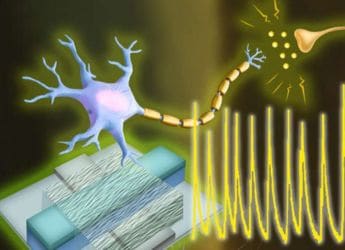- Home
- Science
- Science News
- Engineers Create First Artificial Neurons With Electrical Functions As Living Cells
Engineers Create First Artificial Neurons With Electrical Functions As Living Cells
Engineers at the University of Massachusetts have created the first artificial neurons that will possess the ability to communicate with living cells.

Photo Credit: University of Massachusetts Amherst
Engineers at UMass Amherst unveil artificial neurons performing electrical functions
A new innovation has surfaced as a team of engineers at the University of Massachusetts have created the first artificial neurons. These newly built neurons comprise the features of electrical functions that certainly makes it close to the biological ones. Considering their previous work where they used protein nanowires synthesized from the bacteria which generates electricity, this innovation can lead to the evolution of efficient computers that work on the biological principles and connect with the living cells, present within a human body.
Understanding Electrical Efficiency of a Human Brain
According to Shuai Fu, lead author of the study published in Nature Communications, Although a human brain processes extensive data, however, the power usage is considerably low, as compared with that of electricity used to run a Large Language Model (LLM) like ChatGPT. Likewise, the human brain's efficiency is unmatchable with an electrical computer one. For instance, as the brain is build with billions of neurons, it would consume only 20 Watts to write a story, while, an LLM may consume over a megawatt to do the same.
About the New Artificial Neurons
Stated by Jun Yao, Senior Author of the Paper, “Comparing the newly built artificial neurons with the previous discoveries, the older artificially developed neurons used 100 times more power and 10 times more voltage to enhance the efficiency. While these artificial neurons consumes 0.1 Volts, just like the human body.”
Takeaway
Fu and Yao's recently built neurons will potentially transform the efficiency of electrical devices. With these neurons, the computers will be able to connect directly with the human brain, without have to perform amplifications. These bio-films will be powered by the human sweat and detect the disease via noses.
For the latest tech news and reviews, follow Gadgets 360 on X, Facebook, WhatsApp, Threads and Google News. For the latest videos on gadgets and tech, subscribe to our YouTube channel. If you want to know everything about top influencers, follow our in-house Who'sThat360 on Instagram and YouTube.
- Samsung Galaxy Unpacked 2025
- ChatGPT
- Redmi Note 14 Pro+
- iPhone 16
- Apple Vision Pro
- Oneplus 12
- OnePlus Nord CE 3 Lite 5G
- iPhone 13
- Xiaomi 14 Pro
- Oppo Find N3
- Tecno Spark Go (2023)
- Realme V30
- Best Phones Under 25000
- Samsung Galaxy S24 Series
- Cryptocurrency
- iQoo 12
- Samsung Galaxy S24 Ultra
- Giottus
- Samsung Galaxy Z Flip 5
- Apple 'Scary Fast'
- Housefull 5
- GoPro Hero 12 Black Review
- Invincible Season 2
- JioGlass
- HD Ready TV
- Laptop Under 50000
- Smartwatch Under 10000
- Latest Mobile Phones
- Compare Phones
- Realme 15x 5G
- OPPO A6 5G
- Samsung Galaxy M07
- Xiaomi 17
- Xiaomi 17 Pro Max
- Xiaomi 17 Pro
- Xiaomi 15T Pro
- Xiaomi 15T
- Asus Vivobook S16 (S3607QA)
- Gigabyte AORUS Master 16
- Samsung Galaxy Tab A11+
- Xiaomi Pad 8
- Xiaomi Smart Band 10 Glimmer Edition
- Xiaomi Watch S4 41mm
- Xiaomi Xiaomi TV S Pro Mini LED 55 2026
- Xiaomi TV S Pro Mini LED 65 2026
- Asus ROG Ally
- Nintendo Switch Lite
- Haier 1.6 Ton 5 Star Inverter Split AC (HSU19G-MZAID5BN-INV)
- Haier 1.6 Ton 5 Star Inverter Split AC (HSU19G-MZAIM5BN-INV)












